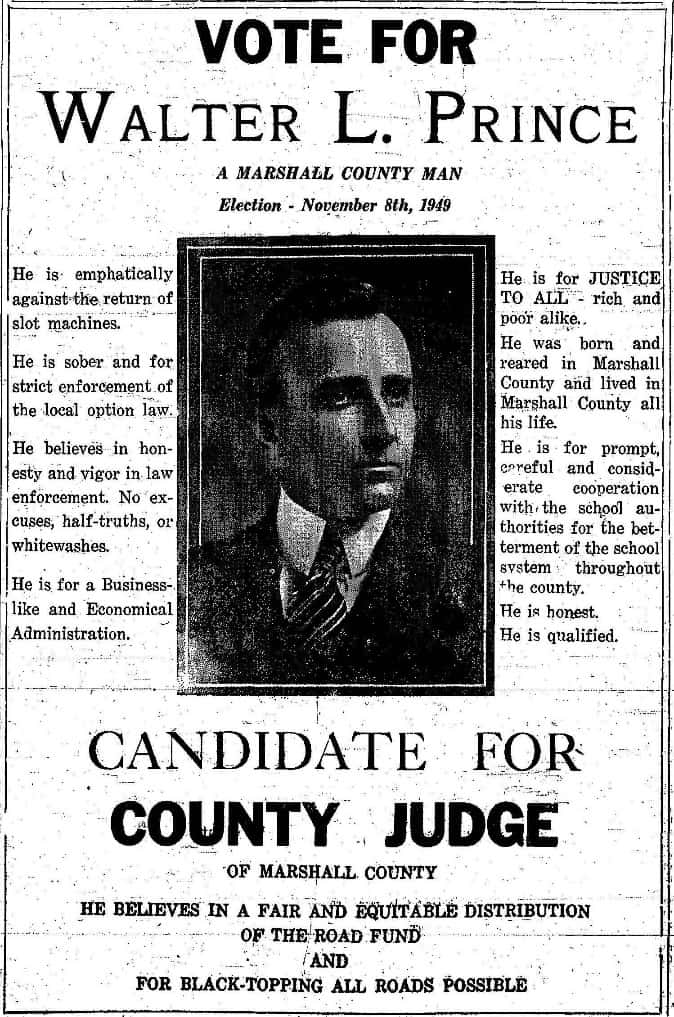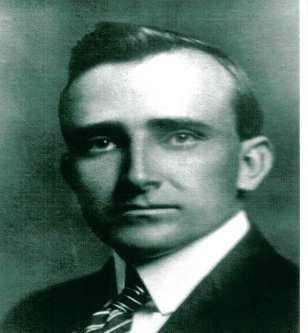Republican Walter Prince Elected County Judge
November 6, 1917
Written by Justin D. Lamb

Campaign poster from Prince’s second run for County Judge in 1949.
(collection of the author)
The election of 1917 was a historic one for Marshall County which resulted in local attorney Walter L. Prince becoming the first Republican to be elected to county-wide office in a stunning upset victory.
Politics of the early 20th century was dominated by one issue, prohibition. Citizens all across the Commonwealth were at odds over the highly divisive issue and the two major political parties were split into wet and dry factions. The liquor question affected every political contest including those on the local level. In Marshall County, the once dominant Democratic Party was badly fragmented over prohibition. A majority of voters in the conservative county favored banning the sale of liquor, which for the first time gave the Republicans an advantage going into local and state elections.
Hoping to capitalize on the prohibition vote taking place in the Kentucky General Assembly, Walter Prince declared his candidacy for County Judge on the Republican ticket in the spring of 1917. Since the founding of the county, Democrats had controlled politics and no Republican had ever held been elected to a county-wide office. However, Prince was very well liked and respected by members of both parties and Republicans sensed an opportunity. “He was a real gentleman,” recalls his grand-nephew James Cross. “He always wore a vested suit and was very well liked by those who knew him.”

County Judge Walter Prince
(Courthouse Collection)
After a bloody Democratic primary which only resulted in further splitting an already splintered party, Zeke Holland was nominated on the Democratic ticket. Long suspected of being a “wet” Democrat, Holland was met with suspicion by the “dry” faction of the Marshall County Democratic Party.
While the Democrats continued to fight it out, Prince campaigned vigorously, asking all the voters in the county to look past his Republican label and give him the opportunity to serve. The Prince family was originally from Mississippi, but sided with the Union and the “Party of Lincoln” during the Civil War. With the defeat of the Confederacy in 1865, the Prince family found it increasingly difficult to live among the ex-Confederates in Reconstruction-era Mississippi, so like many other Union sympathizers, they made the journey north. The Princes eventually settled along the Tennessee River in Marshall County in the Union-sympathizing town of Birmingham. Walter Prince was later born in 1886 in Marshall County and carried on his family’s Republican heritage.
A devout Methodist and member of the Benton Methodist Church where he taught Sunday School, Prince took a strong stand in support of Prohibition in the County Judge’s race while his Democratic opponent “danced around the issue and refused to pick a side.” Prince’s stance appealed to many “dry” Democrats who were leery of Holland.
The race was expected to be close, but when the Democratic nominee showed up to a political speaking at the courthouse noticeably intoxicated just a day prior to the election, the tide quickly shifted in the favor of Prince. When the votes were counted, Prince was narrowly elected by a razor thin margin. “A crack has been made in the Democratic Rock of Gibraltar as ol’ Marshall goes Republican.” reported the Paducah Daily Sun.
After three years into the job, Prince later resigned as County Judge in 1921 following an appointment as Benton Postmaster by the administration of Republican President Warren Harding. The job of postmaster paid a great deal better than the $66.67 monthly salary of a County Judge. To fill out the remainder of Prince’s term, Governor Edwin P. Morrow appointed a fellow Republican attorney, Robert L. Myre of Benton as County Judge. Myre served out the remaining year before moving to Paducah to further his law career.
For the remainder of his life, Prince remained active in Republican politics including serving two terms as First District Chairman of the Kentucky Republican Party. Prince made an unsuccessful run for County Attorney in 1937 and Kentucky Republicans persuaded Prince to run for Congress in 1942, but he was unable to defeat Congressman Noble J. Greogry who had the backing of President Franklin Roosevelt and Senator Alben Barkley.
Prince made another run for the office of County Judge in 1949, but the Republican brand had been severely damaged by the Great Depression, and despite making a very good showing and carrying several precincts, Prince was narrowly defeated by Democrat Leonard Jones. Prince returned to private law practice which he continued until his death in 1959.
